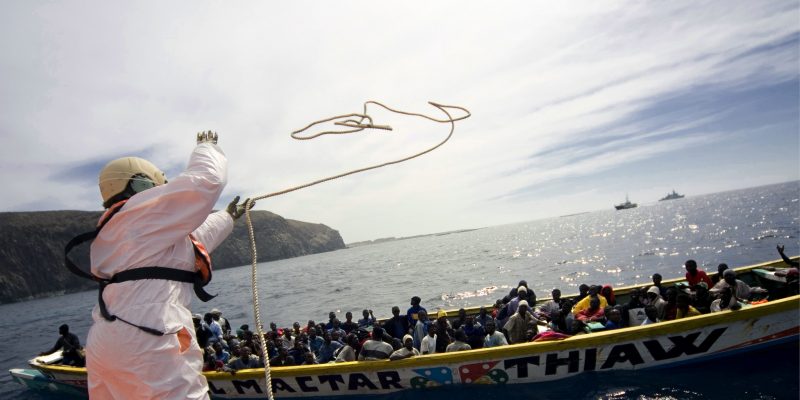1. Record numbers of deaths at sea: nonprofits are blameless, Frontex may not be
In a two-part special for the The Intercept, report Zach Campbell explains why the recent accusations against refugee rescue groups operating in the Mediterranean are unfounded, and why we should be looking at the Frontex intervention strategies instead.
2. The growing trend of criminalising solidarity
The recent attack against NGOs conducting rescue efforts at sea is evidently part of a larger trend of criminalising refugees and migrants. Read Nando Sigona’s analysis in The Conversation (and revisit his op-ed in OpenMigration and our own in-depth analysis).
3. The struggle of Tunisian women seeking justice for the victims of the “boats of death”
Deaths at sea, the fight of Tunisian women – mothers and wives of men who have disappeared while attempting to reach Europe – seeking truth and justice. Sara Manisera and Arianna Pagani told us the story in images and words a few days ago, and now they are reporting in Al Jazeera.
4. “Resignation syndrome”, the new mental health emergency among young refugees in Sweden
April 7 marks World Health Day, and this year the focus will be on mental health, but migrants and refugees have very little cause for celebrating: overall, access to healthcare is an obstacle course, leaving many of them with no chance of healing their wounds – physical and psychological, visible and invisible. Read this heart-breaking story in the New Yorker on the alarming spread of the so-called resignation syndrome (Uppgivenhetssyndrom) among young refugees facing deportation in Sweden, bringing hundreds of children and adolescent to a comatose state. An absolute must-read (see also the recent, interesting scientific study published by the journal Frontiers in Behavioral Neuroscience).
5. Explosive violence, here’s what asylum seekers are fleeing
A new pilot study, based on interviews with hundreds of subjects in Germany, Greece and the UK, documents how the majority of asylum seekers have fled “explosive violence”, from air raids to terrorist attacks. Read Mark Townsend’s article in The Guardian.
6. 5 million reasons to talk about Syria
The humanitarian crisis in Syria is worsening and the United Nations have announced that over 5 million people have been forced to leave their homes to escape the conflict. Yet the world seems to ignore what is happening and global commitment to resettlement is waning. Read Lizzie Dearden’s report for The Independent.
7. Calais is dead, long live Calais
Humanitarian crises are not solved by evacuations and walls, as the situation in Calais continues to attest. After yet another “final” evacuation of the “Jungle” a few months ago, small encampments of migrants are forming again in the French border town. Read the report from Calais by Anne Guillard for Le Monde and the Guardian.
8. Italy’s new immigration law, a harsh blow to human rights system
The controversial Minniti-Orlando bill on immigration is about to become law. Despite some minor improvement from the first draft, there are still several worrying points, especially regarding the extension of detention periods for migrants and the reduced legal protections for asylum seekers, who are now being denied the right to appeal decision. A harsh blow to the human rights system, Senator Luigi Manconi writes for Il Manifesto (read also: Eleonora Camilli for Il Redattore Sociale and Adriano Biondi for Fanpage).
9. Immigrants stealing jobs in Italy is a myth
When it comes to immigration and the economy, ignorance and myths are rife, while few know that immigrants are actually paying for the pensions of hundreds of thousands of Italians, that foreign businesses is boosting our economy, and that the overall statistics on immigration are absolutely positive. The stereotype of “job-stealing immigrants” is especially unfounded, according to a recent study by INPS, since foreign nationals are only doing the menial, flexible jobs that Italians dislike. Read Alessandro Barbera’s article in La Stampa.
10. Good news at last: Italy has passed a new law to protect unaccompanied foreign minors
We end our review on a positive note: Italy’s new law on unaccompanied foreign minors is now a reality, prioritizing the need to protect minors who come to our country and regulating a phenomenon which has been growing to alarming proportions in recent years and which had been met so far with little to no adequate response. Annalisa Camilli’s article in Internazionale illustrates the new law and explains why it is so important.
Translation by Francesco Graziosi.
Cover image: UNHCR Photo Unit / A. Rodriguez (CC BY-NC 2.0).









